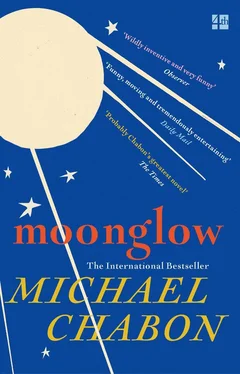A few times, it was true, she had come out with utterances that made no sense whatsoever, in French or English. It was also true that when she was not smiling, she fell into taut silences, seemed to listen for footsteps on the other side of doors, studied shadows in the corners of rooms. When taken to a Baltimore public library for the first time, it was reported, she had made straight for the recordings of Highland reels. The first two peculiarities were put down to her being a relative newcomer to English and a girl who had endured and survived the unspeakable. (Nobody could account for the love of bagpipes.) If one sometimes sensed a weird crackle around her, a scorching like dust on a solenoid, it was believed by the Sisterhood—and seconded by many of their husbands—that this mysteriously added to her allure.
The new rabbi, freshly graduated first in his class from the Jewish Theological Seminary, had charmed everyone with his brilliance and élan, his tailored suits and his faint delicious odor, unexpected in a rabbi, of gardenias. But he displayed a troubling streak of self-will. All his life he had been the pride of his family and the joy of his teachers. As a result he had learned to prefer his own ideas to those of other people, even with regard to subjects, such as the woman he ought to marry, about which he could be expected to know very little. Overt matchmaking attempts, each to a thoroughly eligible candidate, had not turned out well. The Sisterhood caucused and agreed to authorize the use of wiles.
To ensure that the target of the operation could not fail to notice her when he put in his scheduled appearance at “Night in Monte Carlo,” the Sisterhood had posed my grandmother beside the rented palm tree just by the main door of the synagogue’s reception room. Two Sisterhood members were deployed here to pin my grandmother down. Mrs. Waxman, married to a judge, had been the chief sponsor of my grandmother’s petition for refugee status. Mrs. Zellner, among the first Jewish graduates of Bryn Mawr, spoke excellent French. Playing on my grandmother’s sense of obligation and her hunger to speak her mother tongue, the women were prepared to hold her on the spot for however long it took the rabbi to arrive, at which point they would merely put my grandmother in his way, so that afterward—a key to the strategy—he could operate under the impression that he had discovered his future bride for himself.
The rabbi was late. The reception room filled with congregants who knew nothing of the Sisterhood’s maneuverings and were eager for the evening to begin. The chair of the fund-raising committee stepped to the dais. He had prepared a welcome, studded with mildly off-color puns about spades and craps, but when the microphone gave him a mild electric shock, he was obliged to break off his speech. The Sisterhood president shoved her husband toward the dais, where the hired musicians, Jews dressed as fanciful Cubans, loitered with their instruments. The ophthalmologist crouched down beside the chairman of the fund-raising committee. He took the man’s pulse and helped him unbutton his collar. Other male congregants offered assistance in the form of impromptu puns on the words shock, current, spark , what a re volt ing development this was, and so forth.
The fifteen-year-old sound technician struggled to locate and swap in a new mike, a task in which he was hampered by his mother’s constant reminders that he ought to hurry. A scrum kicked up around the table of dairy appetizers, awakening old antipathies and reinforcing new ones. Meanwhile the thong of small talk and college French that the Sisterhood tiger hunters were using to lash their goat to its stake stretched ever thinner. A second microphone was found and tested. The board president was certified fit to conclude his speech.
“Please,” he enjoined all those who had come to try their luck that night, “lose as much and as often as you possibly can.”
The lights were lowered. The dance band generated a supper-club ambiance. Over the cha-cha-cha, the chatter, and the rattle of dice and roulette balls, my grandmother’s handlers found it impossible to maintain their grip on her. She took a package of Herbert Tareytons from her borrowed beaded clutch.
“I find it is very warm in this room,” she said, still unsuspecting her status as prey but conscious of the strain on the conversational tether. “Excuse me, please. Maybe I will have a look at the beautiful moon.”
All at once the moon of Mrs. Zellner’s face was suffused with delight. In her relief she may have tipped her hand slightly.
“ Mais voilà le rabbin! ” she cried.
* * *
All day my grandfather had busied himself finding reasons not to accompany Uncle Ray to “Night in Monte Carlo.” He was not ready to mix with “regular people.” He was uncomfortable making small talk with strangers. He lacked the funds and the appropriate attire. He had no use for synagogues. He would just get in his brother’s way. Each of these reasons, with the aplomb of a born dialectician, Uncle Ray discounted, dismissed, disarmed, or batted to one side. He appreciated the challenge a return to civilian life must represent, he said, but in the end you just had to hold your breath and jump into the pool. Nobody, apart from traveling salesmen and the people who accosted you in bus terminals, was comfortable making small talk with strangers. He would happily stake my grandfather for the evening, to be repaid by the winnings or at a later date. He owned a very nice blazer, Harris tweed, that was much too big in the shoulders for him. A synagogue, when you came right down to it, was only a building; great Jews from Abraham to Hillel had never laid eyes on one. And everyone, by design and almost by definition, was in a rabbi’s way.
When the time came to leave for the synagogue, the only card my grandfather still held was to make himself disagreeable. Pick a fight and hope to be uninvited.
The problem with this approach was Uncle Ray’s satisfaction with himself and his opinions. Whatever position you adopted, Uncle Ray alighted on higher ground. Attacks on his person or character could have no basis in fact; the kid just laughed them off. My grandfather hit him with surliness, scorn, wet-blanket inertia. Uncle Ray floated effortlessly above it all. But in the parking lot of Ahavas Sholom, as they were about to get out of his brother’s brand-new Mercury coupe—Ray already had his door open—my grandfather, in his desperation to give offense, stumbled at last on a viable approach.
In the winter of 1947, no one—least of all Uncle Ray—was conscious of the creeping unbelief that afterward began to trouble my great-uncle and ultimately led him to exchange his pulpit for the pool halls and racetracks of Baltimore, Wilmington, and Havre de Grace. My grandfather seemed to have picked up on some early vibration of the crisis to come. From childhood he had suspected Uncle Ray of faking “the whole ‘boy tzaddik ’ thing,” to gain the attention and approval first of their parents, then of the greater Jewish world. A sibling’s ESP guided my grandfather’s hand as it reached for the quiver, let fly the shaft.
“You don’t see the irony?” he said. “‘Night in Monte Carlo’? You don’t see how disingenuous that is? The whole joint’s already a fucking casino, Ray. A sideshow tent. Remember, upstairs from Pat’s Steak, that crew came in and opened a betting office? Those grifters from Buffalo who fleeced Frank Osterberg? That’s you. You’re running a wire store. Taking bets on races you’re never going to have to pay off because you already know the result. The marks come in, you take their money. Promise them what, forgiveness, eternity, a line item in God’s account book? Then you just sit back and wait for the blow-off. Give them a few last words of mumbo-jumbo, plant their chump bodies in the ground.”
Читать дальше












